1. Introduction
At the airport exit, some people wait for the arrival of celebrities with their luminous brands, carrying cameras or carrying bouquets. Before the epidemic of Covid-19, such scenes are prevalent. At that time, fan interaction of Chinese artists mainly focused on offline activities, such as concerts, music festivals, and TV shooting sites. However, after the corona-virus appeared, people were limited to solitary, so fans started to hold various activities on social media. Interest needs and emotional satisfaction are the starting point of interaction between members and the motivation of the interaction ritual [1]. For Chinese fans, Sina Weibo has become an essential space for discussion and entertainment [2].
Sina Weibo is a micro-blogging website in China. Users can get information on breaking news, social events, and products [3]. With instant openness, strong interaction, fast transmission speed, and a broad influence range, it has become one of China's most popular social media [4]. Weibo allows the creation of tribes in the digital era and a new form of sociality [5]. A significant component of them is the network's virtual fan community, Super Topics on Weibo.
Henry Lau is a Canadian Chinese musician who is active in China and South Korea. He has 12.56 million fans on Sina Weibo. These fans, called strings, established Henry Lau Super Topics on Weibo and interacted within Super Topics. Super Topics (ST) is a module on Weibo open for fans to communicate within the fan community. Fans are able to post, comment, and repost a wide variety of artist-related content in ST. In this study, by surveying fans in Henry Lau’s Super Topics, we get access to the feedback from fans about the function of Weibo and how Super Topics works as an online platform for fan communication.
2. Literature Review
2.1. China's Network Environment Under Covid Epidemic
During the COVID-19 pandemic, people need to keep in touch at a social distance. As the need for communication and connecting increases, using the internet has become accepted as a way of being present in the world rather than a means of accessing some discrete virtual domain [6]. With the development of information technology, the internet allows people to find new support communities [7]. Ma, Xiaozhen proposed that these virtual communities are defined as NETWORKED activities to enhance members' common emotions, interests, and worries through interactive communication guided by established rules [1]. These virtual communities have allowed many people to interact with others without geographical restrictions during the epidemic.
2.2. The Origin of Fan Culture
The term "fan" comes from "fanatic" [8], a term typically applied to a person who is over, even aggressively enthusiastic about a person, team, cultural product, etc. Jenkins’s definition of fans states that fans are individuals who maintain a passionate connection to popular media, assert their identity through their engagement with and mastery over its contents, and seek social affiliation around shared tastes and preferences [9]. Fans regard their common interests as an outlet for their creativity, fun, and leisure, which are important aspects of the human experience [10].
2.3. Communication in Fan Communities
One of the motives for building a fandom is creativity. Fans often edit and create new content related to their shared passion — for instance, they create GIF animations and memes, and edit photos and videos for loved celebrities [10]. By sharing the updated news of the celebrity with one another, fans can easily enjoy the works of other fans and feel a sense of belonging [11]. Due to their feelings of enjoyment, security, and belongingness [12], they are motivated to further promote their position in the community. For example, a fan will post pictures of celebrities in the community. These Photoshop processed photos are good-looking and can attract praise and replies from other fans. In the interaction process, the fan gradually becomes an influencer in the community.
2.4. The Super Topics
Users of Weibo form interest communities that disseminate information and other messages online [13]. Throughout this paper, we use Super Topic (ST) to refer to the fan community. Super Topic (ST) is an interactive aggregate of online interest content created by individuals who share a similar entertaining culture around a long-term discussion point. Fans may create or enjoy a range of posts in the community depending on their affection for or interest in celebrities. The function of a ST is to convey emotion, communicate with fans, and interact with them [1]. Therefore, fans design increasingly intricate fan-celebrity interactions and fan-fan communicative events [14]. Within fan communities, fans pointed to official authority, investment, cultural capital and social capital as means of hierarchy creation [15].
Research questions:
1. Does the interaction module such as hashtags effectively facilitate fans for searching?
2. Does the fan hierarchy play a role in maintaining a good environment in ST?
3. How do these functions influence audience engagement in the community?
3. Methodology
3.1. Weibo Sampling
As a member of a Weibo fan group, I have inside knowledge of how Weibo Super Topics function, and how the communities can enhance users’ experience of fandom. To study how musicians' fans interact in online communities, this paper assesses the fandom of Henry Lau. Henry is a Canadian singer, songwriter, musician, record producer, and actor based in South Korea and China. Lau’s Super Topics contains 270,000 members. I will use that fandom as a case to explore the interaction of fans and to analyze engagement data from Weibo Super Topics.
3.2. Observation
Since February 18, 2022, the author has observed the activity data in ST over two weeks, including the number of new posts and new fans every day. In Henry Lau’s ST, there were an average of 178 new posts per day, with an average increase of 566 new followers per day. When compared in parallel with other ST activity data, this number can be ranked approximately in the top 30%. This data reveals that Henry Lau's ST community is active. Through the observation, Lau’s ST has a complete functional structure, including a clear module layout, orderly post management, and organized fan communication space. This appearance proved the significance of the survey as the ST is both active and managed.
3.3. Survey
The Survey aimed to get data about the habits of the fans in the Super Topics and explore fans' attitudes and feelings towards the Weibo function. I expected to get general data, which may reflect the public's attitude, so I used survey to get a large amount of data.
The questionnaire was only published in the Weibo ST of Henry, which means that only those who are participants of ST can fill it in. This narrowed the scope of the audience, improving the authenticity and accuracy of the data. Also, when issuing the questionnaire, it is emphasized that the interpretation of the survey results does not involve any personal privacy information and personal benefits. This reduces the psychological constraints of respondents so that I can obtain relatively accurate data instead of biased ones.
3.4. Data Collection
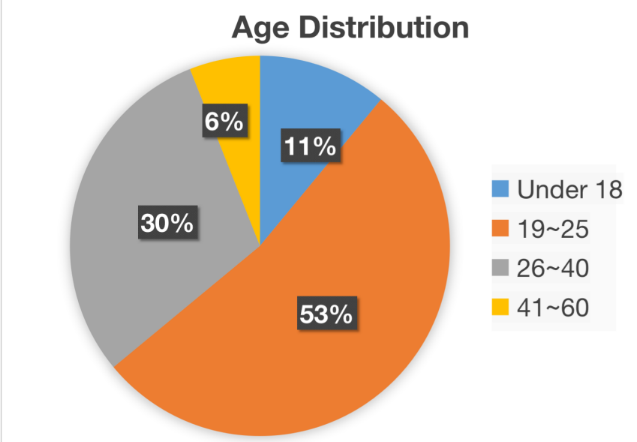
Figure 1: Age distribution of the members in ST.
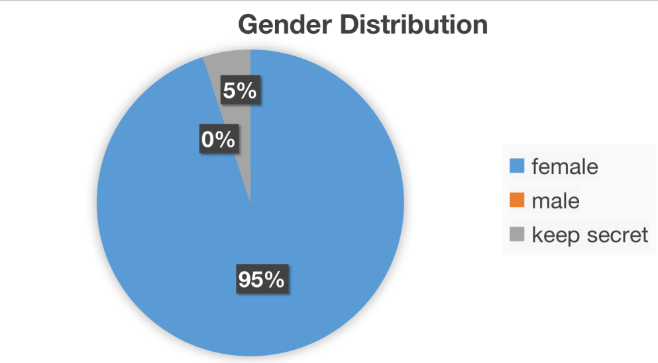
Figure 2: Gender distribution of the members in ST.
In this survey, 100 questionnaires were collected (the list of questions in the questionnaire is in the annex). Figure 1 shows the age distribution of fans in Henry Lau ST. More than half (53%) of the fans range in age from 19 - 25, and nearly one-third (30%) of the fans are aged 26 to 40. Combined with career questions, most of Henry Lau's fan groups are adult students or young social people. At the same time, as shown in Figure 2, of the 100 questionnaires, all the remaining samples were women except for five selected confidential gender. This proportion shows that the gender distribution in Henry Lau's super topics is very uneven, or the fans who are willing to participate in the survey are women.
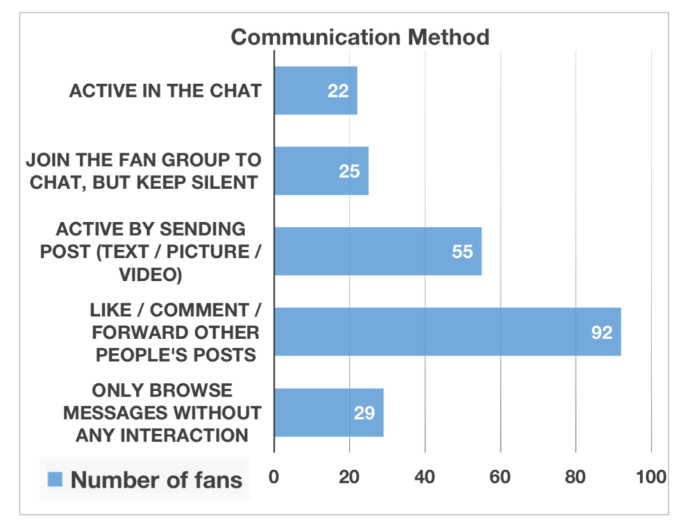
Figure 3: The communication methods used by community members.
Among the results of some selected topics, this survey reflects most of the ways fans interact in ST. As shown in the column chart in Figure 3; many fans will interact with other people's posts, send posts or join chats. These are the main functions of ST. Fans communicate through likes, comments, and other ways.
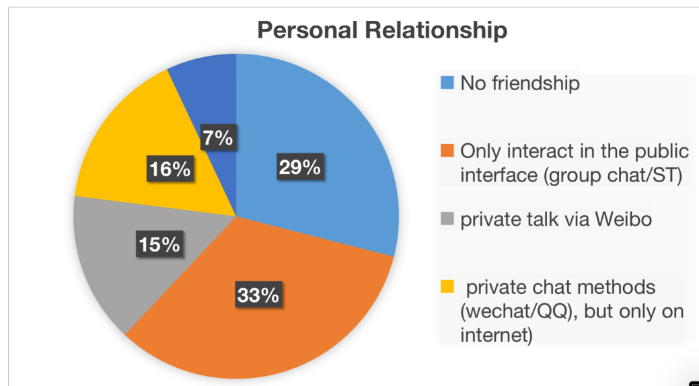
Figure 4: Fans’ personal relationship with each other.
Then, the survey explored the communication function of ST for fans. The respondents chose their social depth in the questionnaire, including public, private, and offline meetings. As shown in Figure 4, most of Henry's fans choose to make shallow friendships (no friendship or just public interaction). Nevertheless, 7% of fans have formed friendship relationships online to offline, which is not a low percentage, reflecting that fans can use ST as a platform to enlarge their social circle.
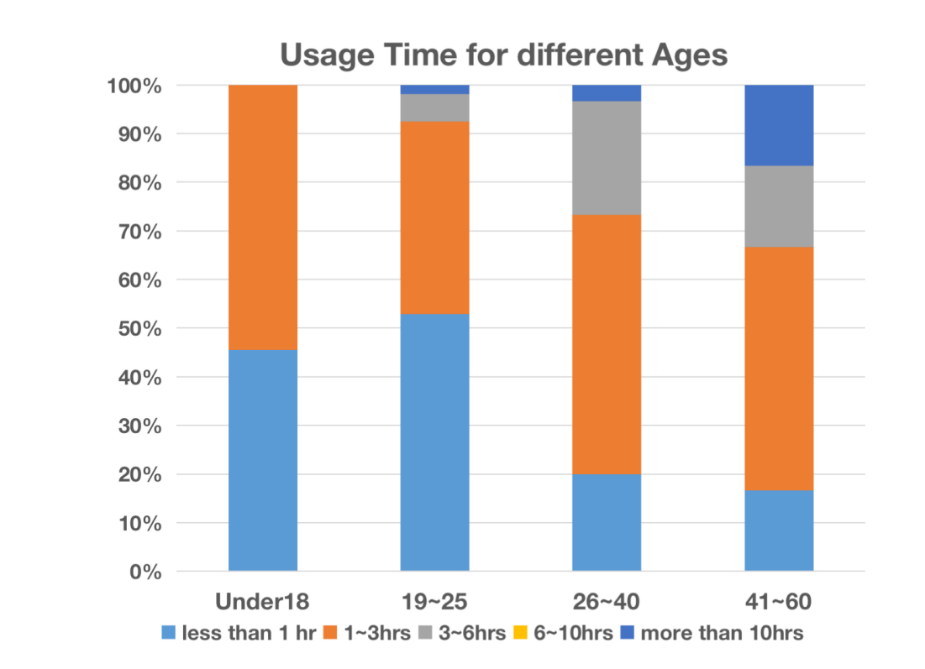
Figure 5: Usage time of ST for fans of different ages.
According to the survey, age is an essential factor determining fans' activity in ST or the evaluation of ST. Thus, the following image use age as a variable. Figure 5 shows the proportion of fans of different ages who use super talk time every day. Obviously, the older they are in the histogram, the more time they spend using ST, which reflects the importance of ST in their lives to a certain extent. It is understandable because younger fans need to focus more on studying or working.
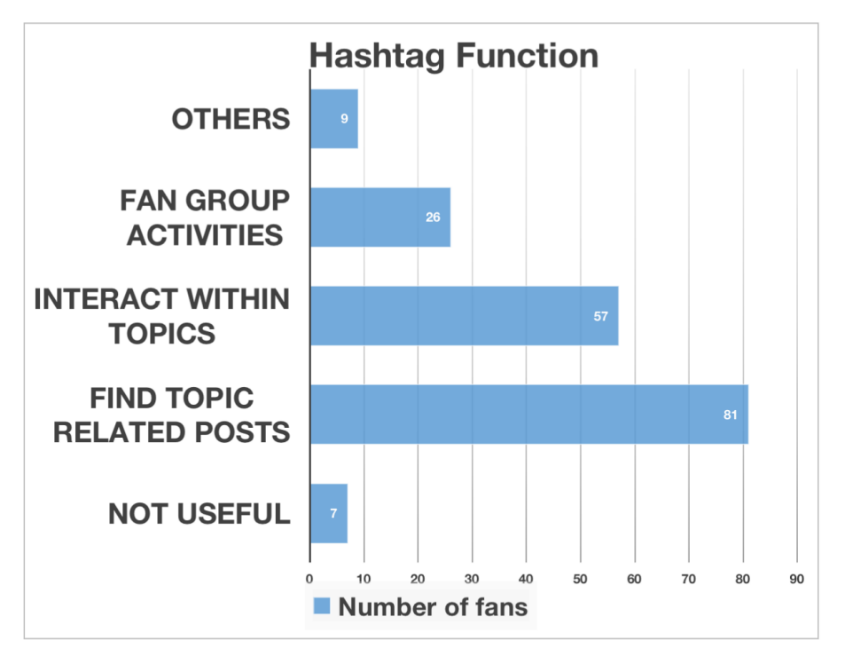
Figure 6: The function of hashtags in ST.
As for using hashtags or labels in ST, as shown in Figure 6, most (81%) fans agree that hashtags can facilitate fans to find relevant posts or participate in topic discussions. In the answer to "others," fans also reflected that the role of hashtags is to increase popularity or as a tool to publicize artists.
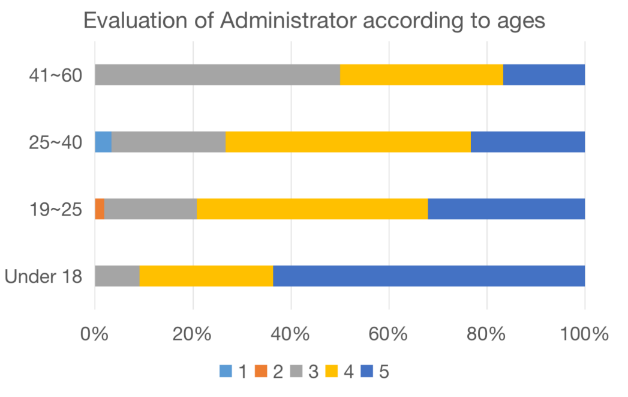
Figure 7: ST members’ evaluation of community administrators at different ages.
In the previous survey, most fans agree that the administrators of ST manage the posts, organize fans' activities, and deal with anti-fans. The attitudes of fans of different ages towards ST administrators are shown in Figure 7. Significant differences can be seen in the colors in the figure. This question collects the comments of fans of different ages on administrators by scoring from 1 to 5. With age, relative high scores decreased, and moderate or negative evaluations increased. This result may show that older people in the fan group can have more reflective evaluations rather than blindly trust the administrator.
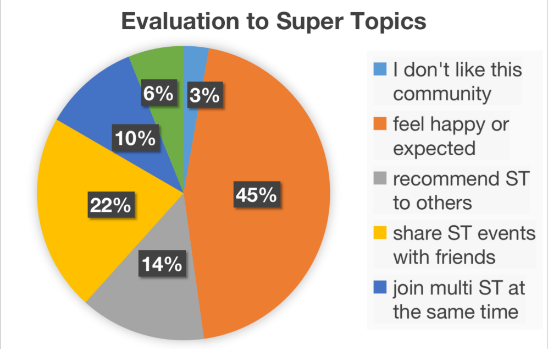
Figure 8: ST members’ evaluation to the community in general.
Finally, the questionnaire asked about the fans' overall evaluation of ST as an online community and set some assumptions that can be checked for the respondents. As shown in Figure 8 above, there are statements like “you will be happy with the content in ST” and “you will share st content with friends or join multiple STs”. This pie chart shows that most people maintain a positive attitude towards the community. Some fans are willing to share and say, "I feel happy when I watch Super Topics every day. Community activities are relaxing."
4. Findings
4.1. Hashtag can help Disperse Information
Fans commonly use the hashtag sign (#) to represent a discussion in ST. The hashtag serves as an indexing system in both the clerical sense and the semiotic sense [16]. According to the survey results, more than 81% of fans frequently use hashtags and find them helpful in searching for information. The most common use of hashtags is to convey information about the unfolding or upcoming events [15]. The short form and its capacity to generate "discussion" around that context allow fans to disperse information [17]. For example, suppose Henry will perform at a music festival in China in a month. In that case, fans will use the label #HenryMusicFestival# in advance to gather posts that contain their expectation or cheering. This is an effective way of expression to facilitate the dissemination of new information, especially on Weibo where everyone can join the discussion.
4.2. Bloggers and Administrators’ Special Position
On Weibo, some fans have special V marks on their avatars in the fan group. The logo of these bloggers symbolizes personal influence and indirectly constitutes the hierarchy among fans. These bloggers can spread new information about Henry or maintain the order of ST. In the study, fans' views on the super fan class are more critical. Some fans believed that "managers are not responsible for controlling the atmosphere in time" or that "bloggers have given too much publicity to ordinary fans." In the survey, some fans come up with the idea that poor communication and a certain degree of selfishness are the fundamental causes of these problems. In order to maintain a good community environment, fans should communicate more with each other and break class boundaries. Administrators should make democratic voting or public discussion decisions to consider regular fans' attitudes.
4.3. Fans’ Engagement and Evaluation
The majority of fans in the study were satisfied with their participation in ST or felt that ST made them happy. The results of this study suggest that ST is effective as a fan community in terms of its communication function. Most of the fans in the survey did not know other friends in reality and did not develop deep friendships. In fact, those fan groups provide a sense of connection and emotional security even if fans have never met each other [18]. As a result of this feeling, 97% of the respondents made positive comments about ST, taking advantage of the ease of communication.
5. Conclusion
In conclusion, by understanding the survey and feedback of fans on the super topics, the functions of Sina Weibo, such as hashtags and hierarchy, can effectively increase followers' engagement and bring positive influence. Hashtags and post-classification can facilitate fans finding the information they need quickly, and fan management can help maintain community order and promote activity. Under the overall operation of all super voice functions, fans can get a relaxed and pleasant star-chasing experience in Super Topics. Under the restricted activity due to the Covid, Weibo Super Topics works as a communication space for fans to transmit information and build up friendships.
5.1. Limitations
Admittedly, this study has limitations. It’s true that most of Super Topics' audience is limited to Chinese netizens. Therefore, the findings of this research into what is on Weibo may not translate to cross-border or even global communities of fans. However, fans of the same artist have a united fan base, meaning that fans from different regions may have similar views and perspectives. With the help of online communication, celebrities and fans are active on global platforms. Thus, the research results on Chinese fans can also be applied to fans in other countries to a certain extent. The conclusions described in this article have certain universality and significance for global social media.
In addition, in some questions that should have differences and fans' attitudes will be more extreme, most (nearly 100%) fans gave positive replies and comments. This high degree of recognition is remarkable because it reflects on whether there is a blind following in the fan group and the lack of critical thinking among individual fans. Hence, there can be further research. More research should obtain fans' attitudes by designing questions more skillfully using more in-depth questions. Also, it would be good to interview individual fans to get a detailed explanation, which is more flexible.
Appendix: Translated Interview Transcript
Q1. What’s your age?
Q2. What's your gender?
Q3. how often are you on the site daily? (Lurker vs. active engagement)
Q4. How often do you update content or share ideas in the ST?
Q5. What do you do in the community?
Q6. How do you value your participation in the community? (IDENTITY)
Q7. Have you developed friendships with other fans? What’s your relationship?
only talk in public, talk privately through the site, have private contact but only online, talk online and you’ve met before, etc.
Q8. What do you think is the role of post classification in ST?
Q9. What do you think of individual bloggers (videos, pictures...) among fans?
Q10. What do you think is the role of administrators? Have they worked so far?
Q11. How do you evaluate the Super Topics? Check all that apply
do you recommend to others/are you a fan on other sites/feel happy when reading/share virtual events with real life friends
References
[1]. Ma, Xiaozhen, et al. "Weibo “Super Topic Community”: Virtual Community from the Perspective of Interactive Ceremony Chain." 7th International Conference on Social Science and Higher Education (ICSSHE 2021). Atlantis Press, 2021.
[2]. Baym, Nancy K. "Interpreting soap operas and creating community: Inside a computer-mediated fan culture." Journal of folklore research (1993): 143-176.
[3]. Lei, Kai, et al. "Understanding user behavior in Sina Weibo online social network: A community approach." IEEE Access 6 (2018): 13302-13316.
[4]. Miao, Ruijie, and Kongyu Yang. "Research on Prediction the Development Trend of Weibo Topics Based on Fuzzy Neural Network." Journal of Physics: Conference Series, vol. 1288, no. 1, 2019.
[5]. Chang, WoongJo, and Shin-Eui Park. "THE FANDOM OF HALLYU, A TRIBE IN THE DIGITAL NETWORK ERA: The Case of ARMY of BTS." Kritika Kultura (2019).
[6]. Hine, Christine. Ethnography for the internet: Embedded, embodied and everyday. Routledge, 2020.
[7]. Jia, Lianrui, and Xiaofei Han. "Tracing Weibo (2009–2019): The commercial dissolution of public communication and changing politics." Internet Histories 4.3 (2020): 304-332.
[8]. Bird, S. E. "Chatting on Cynthia's Porch: Creating Community in an e-Mail Fan Group." The Southern Communication Journal, vol. 65, no. 1, 1999, pp. 49-65.
[9]. Jenkins, Henry. “Fan.” In Keywords for Media Studies, edited by Laurie Ouellette and Jonathan Gray, 65–7. New York: New York University Press, 2017.
[10]. Ringland, Kathryn E., and Christine T. Wolf. "" You're my best friend." finding community online in BTS's fandom, ARMY." XRDS: Crossroads, The ACM Magazine for Students 28.2 (2022): 66-69.
[11]. Sundet, Vilde Schanke, and Line Nybro Peteresen. "Ins and outs of transmedia fandom: Motives for entering and exiting the SKAM fan community online." Poetics 84 (2021): 101510.
[12]. Yin, Yiyi. "“My baby should feel no wronged!”: Digital fandoms and emotional capitalism in China." Global Media and China 6.4 (2021): 460-475.
[13]. David, Clarissa C., Corpus O. Jonathan, and T. L. Erika Fille. "Tweeting Supertyphoon Haiyan: Evolving Functions of Twitter during and After a Disaster Event." PLoS One, vol. 11, no. 3, 2016.
[14]. Baym, Nancy K. Tune in, log on: Soaps, fandom, and online community. Vol. 3. Sage, 2000.
[15]. McCudden, Michelle Lynnae. Degrees of fandom: Authenticity & hierarchy in the age of media convergence. Diss. University of Kansas, 2011.
[16]. Bonilla, Yarimar, and Jonathan Rosa. "# Ferguson: Digital protest, hashtag ethnography, and the racial politics of social media in the United States." American ethnologist 42.1 (2015): 4-17.
[17]. Alamán, Ana P. "HASHTAG POLITICS IN TWITTER." Vivat Academia, vol. 23, no. 152, 2020, pp. 49-68.
[18]. Kim, Jihye, Kim Hyung-Min, and Minseong Kim. "The Impact of a Sense of Virtual Community on Online Community: Does Online Privacy Concern Matter?" Internet Research, vol. 31, no. 2, 2021, pp. 519-539.
Cite this article
Qiao,Y. (2023). How Does Weibo's "Super Topics" Enhance the Experience of Fans?. Lecture Notes in Education Psychology and Public Media,4,270-278.
Data availability
The datasets used and/or analyzed during the current study will be available from the authors upon reasonable request.
Disclaimer/Publisher's Note
The statements, opinions and data contained in all publications are solely those of the individual author(s) and contributor(s) and not of EWA Publishing and/or the editor(s). EWA Publishing and/or the editor(s) disclaim responsibility for any injury to people or property resulting from any ideas, methods, instructions or products referred to in the content.
About volume
Volume title: Proceedings of the International Conference on Interdisciplinary Humanities and Communication Studies (ICIHCS 2022), Part 3
© 2024 by the author(s). Licensee EWA Publishing, Oxford, UK. This article is an open access article distributed under the terms and
conditions of the Creative Commons Attribution (CC BY) license. Authors who
publish this series agree to the following terms:
1. Authors retain copyright and grant the series right of first publication with the work simultaneously licensed under a Creative Commons
Attribution License that allows others to share the work with an acknowledgment of the work's authorship and initial publication in this
series.
2. Authors are able to enter into separate, additional contractual arrangements for the non-exclusive distribution of the series's published
version of the work (e.g., post it to an institutional repository or publish it in a book), with an acknowledgment of its initial
publication in this series.
3. Authors are permitted and encouraged to post their work online (e.g., in institutional repositories or on their website) prior to and
during the submission process, as it can lead to productive exchanges, as well as earlier and greater citation of published work (See
Open access policy for details).
References
[1]. Ma, Xiaozhen, et al. "Weibo “Super Topic Community”: Virtual Community from the Perspective of Interactive Ceremony Chain." 7th International Conference on Social Science and Higher Education (ICSSHE 2021). Atlantis Press, 2021.
[2]. Baym, Nancy K. "Interpreting soap operas and creating community: Inside a computer-mediated fan culture." Journal of folklore research (1993): 143-176.
[3]. Lei, Kai, et al. "Understanding user behavior in Sina Weibo online social network: A community approach." IEEE Access 6 (2018): 13302-13316.
[4]. Miao, Ruijie, and Kongyu Yang. "Research on Prediction the Development Trend of Weibo Topics Based on Fuzzy Neural Network." Journal of Physics: Conference Series, vol. 1288, no. 1, 2019.
[5]. Chang, WoongJo, and Shin-Eui Park. "THE FANDOM OF HALLYU, A TRIBE IN THE DIGITAL NETWORK ERA: The Case of ARMY of BTS." Kritika Kultura (2019).
[6]. Hine, Christine. Ethnography for the internet: Embedded, embodied and everyday. Routledge, 2020.
[7]. Jia, Lianrui, and Xiaofei Han. "Tracing Weibo (2009–2019): The commercial dissolution of public communication and changing politics." Internet Histories 4.3 (2020): 304-332.
[8]. Bird, S. E. "Chatting on Cynthia's Porch: Creating Community in an e-Mail Fan Group." The Southern Communication Journal, vol. 65, no. 1, 1999, pp. 49-65.
[9]. Jenkins, Henry. “Fan.” In Keywords for Media Studies, edited by Laurie Ouellette and Jonathan Gray, 65–7. New York: New York University Press, 2017.
[10]. Ringland, Kathryn E., and Christine T. Wolf. "" You're my best friend." finding community online in BTS's fandom, ARMY." XRDS: Crossroads, The ACM Magazine for Students 28.2 (2022): 66-69.
[11]. Sundet, Vilde Schanke, and Line Nybro Peteresen. "Ins and outs of transmedia fandom: Motives for entering and exiting the SKAM fan community online." Poetics 84 (2021): 101510.
[12]. Yin, Yiyi. "“My baby should feel no wronged!”: Digital fandoms and emotional capitalism in China." Global Media and China 6.4 (2021): 460-475.
[13]. David, Clarissa C., Corpus O. Jonathan, and T. L. Erika Fille. "Tweeting Supertyphoon Haiyan: Evolving Functions of Twitter during and After a Disaster Event." PLoS One, vol. 11, no. 3, 2016.
[14]. Baym, Nancy K. Tune in, log on: Soaps, fandom, and online community. Vol. 3. Sage, 2000.
[15]. McCudden, Michelle Lynnae. Degrees of fandom: Authenticity & hierarchy in the age of media convergence. Diss. University of Kansas, 2011.
[16]. Bonilla, Yarimar, and Jonathan Rosa. "# Ferguson: Digital protest, hashtag ethnography, and the racial politics of social media in the United States." American ethnologist 42.1 (2015): 4-17.
[17]. Alamán, Ana P. "HASHTAG POLITICS IN TWITTER." Vivat Academia, vol. 23, no. 152, 2020, pp. 49-68.
[18]. Kim, Jihye, Kim Hyung-Min, and Minseong Kim. "The Impact of a Sense of Virtual Community on Online Community: Does Online Privacy Concern Matter?" Internet Research, vol. 31, no. 2, 2021, pp. 519-539.









